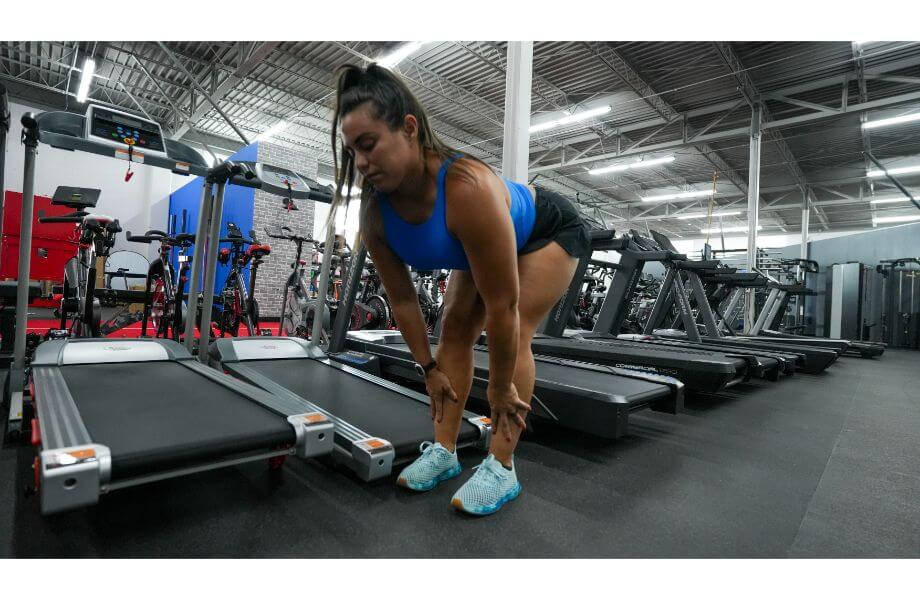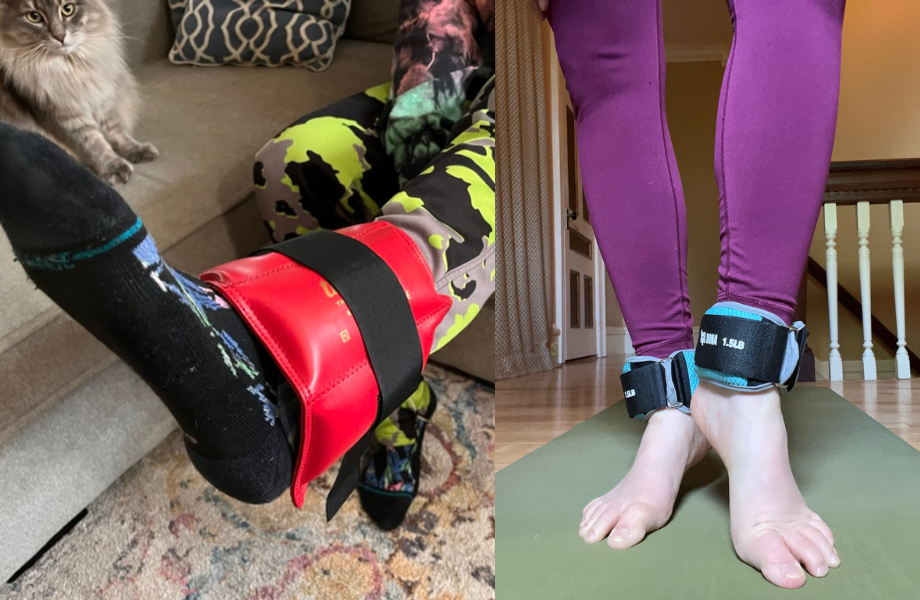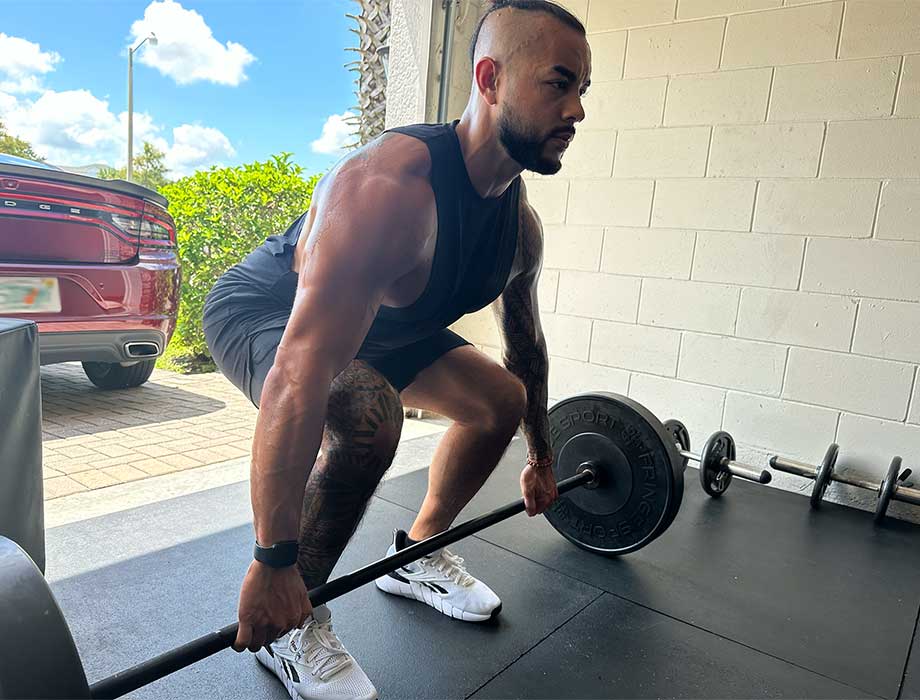Cardio-intensive training can quickly burn calories and fat, get your metabolism working hard throughout the day, boost serotonin, and improve your broader athletic performance.
As a personal trainer, I love helping people reach their fitness goals. Here, I present an intensive upper-body cardio workout routine to help you burn fat while building muscle. I also wanted to keep it simple, letting you do this in your hotel room when traveling or as a home workout when you don’t have time to go to the gym. All that’s required is a pair of dumbbells, your bodyweight, and will. (If you don’t have dumbbells, you can also use kettlebells.)
With that said, let’s get into it!
20-Minute Upper-Body Cardio Workout
Note: The reps are mere suggestions. Whether you are a beginner or an advanced athlete, make adjustments to the suggested rep range accordingly. You can build up the reps as you improve!
Warm up with a slight jog in place or jumping jacks, prepping your body and mind for what comes next! You can also do some arm circles and resistance band pull-aparts to prep the upper body.

Opener: 3 Sets
- Push-ups: 10 to 30 reps
- Mountain climbers: 20 to 50 reps
- Burpees: 10 to 30 reps
- Dumbbell thrusters: 10 to 30 reps
Catch your breath, reset, and make sure those dumbbells are ready-to-go!
Closer: 3 Sets
- Lunge and bicep curl: 10 to 20 reps
- Dumbbell bent over row: 10 to 20 reps
- Dumbbell tricep extension: 10 to 20 reps
- Floor dumbbell chest press: 10 to 20 reps
How to Do Upper-Body Cardio Exercises
A step-by-step guide on how to do these movements.
Push-Ups
Why Do It: Push-ups are predominantly done as a strength-building exercise. The exercise primarily helps build muscle in your shoulders and chest. However, it also stimulates muscle growth in your core and lower body. While traditionally done as a strength exercise, push-ups can also elevate your heart rate and burn calories. From the diamond to clap push-ups, there are various ways to do this strength-building exercise, but here we will explain the most basic push-up.
How to Do It:
- Get down into a high plank position with your palms planted firmly on the ground just outside shoulder width. Ensure your arms are shoulder-width apart, with your feet together or within a foot of each other.
- From the plank, aim to lower yourself to the ground while maintaining a tight core. When lowering yourself, keep your back straight. Go to your depth; some people can touch their chest to the ground, some people touch their nose to the ground. The most important thing is to keep your back straight, preventing the hips from dropping to the ground.
- When you reach your end range of motion, push yourself back up to your original high plank position, then repeat.
There are many modifications with the push-up, such as doing them to an elevated surface or doing them with your knees on the ground.
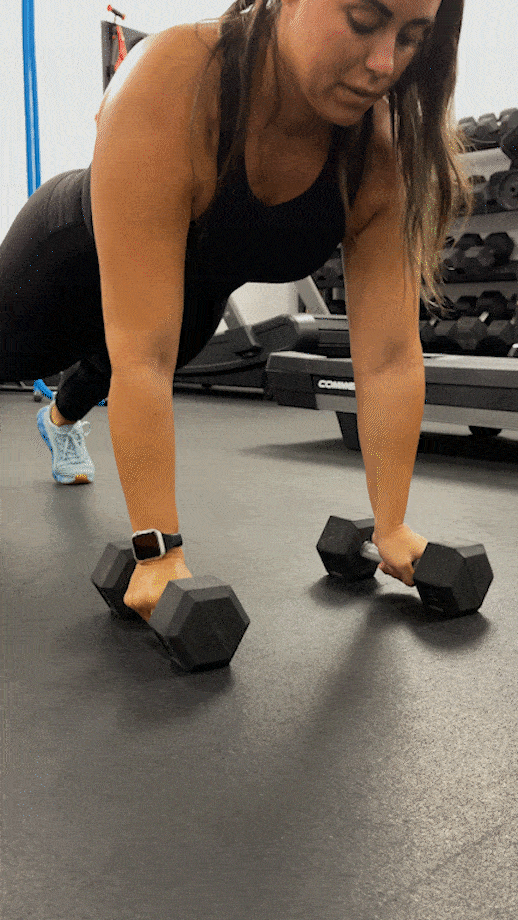
Mountain Climbers
Why Do It: Mountain climbers are a great exercise that combines strength and cardio in one. The mountain climber’s explosive movement offers a cardio rush, while the technique helps to stimulate muscle growth primarily in your core and shoulders.
How to Do It:
- Get down into a high plank position, with your weight evenly balanced between your palms and the balls of your feet.
- Once established in the plank, begin explosively alternating bringing each knee to your chest. When one leg’s foot touches the ground, the other should immediately raise its knee to the chest.
- While maintaining an explosive high-intensity in your leg movements, always ensure your butt stays down, and your high plank angle is preserved where your core feels a parallel burn to the exercise’s cardio stimulation.
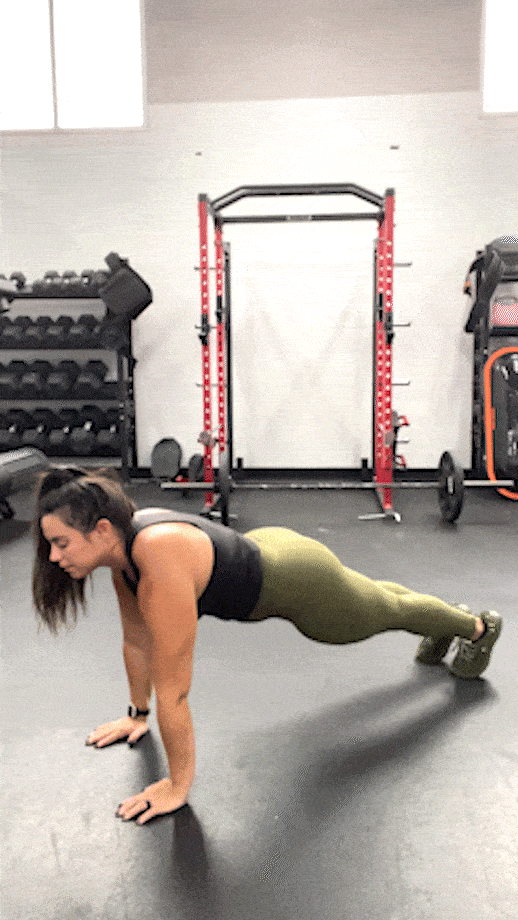
Dumbbell Bent-Over Row
Why Do It:
The dumbbell bent-over row is a strength workout that efficiently activates almost every muscle group in your back, especially your lats and traps. Beyond your back, the practice can also stimulate your biceps and core.
How to Do It:
- Holding a dumbbell in each hand, situate yourself with your feet firmly planted hip-width apart.
- From here, push your hips back, slightly bend your knees, and lower your torso so it’s almost facing the ground. Your arms are outstretched, holding each dumbbell.
- While holding your original stance, pull the weights to your sides, utilizing your shoulder blades as a leading source of strength.
- When the dumbbells reach the sides of your torso with your elbows tucked, pause for a moment, then slowly extend your arms to their original outstretched position, then repeat.
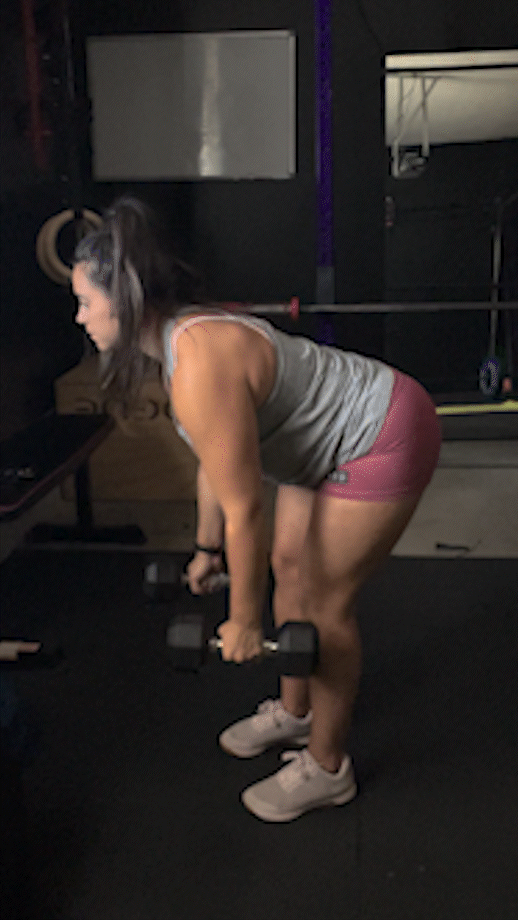
Floor Chest Press
Why Do It:
The dumbbell floor press is a strength training exercise that primarily engages the shoulder, triceps, and chest. The exercise also allows you to embrace the benefits of the dumbbell press without needing a bench.
How to Do It:
- Lower yourself to the ground with your back flat on the floor, knees bent, and your feet firmly planted into the ground. Your body should resemble a classic sit-up position.
- When situated, grab a dumbbell with each hand and hold them up with your upper arms slightly elevated and parallel to the ground.
- From here, press the dumbbells upward, fully extending your arms to where the dumbbells meet. Then, bring them back down to your starting position, and repeat.
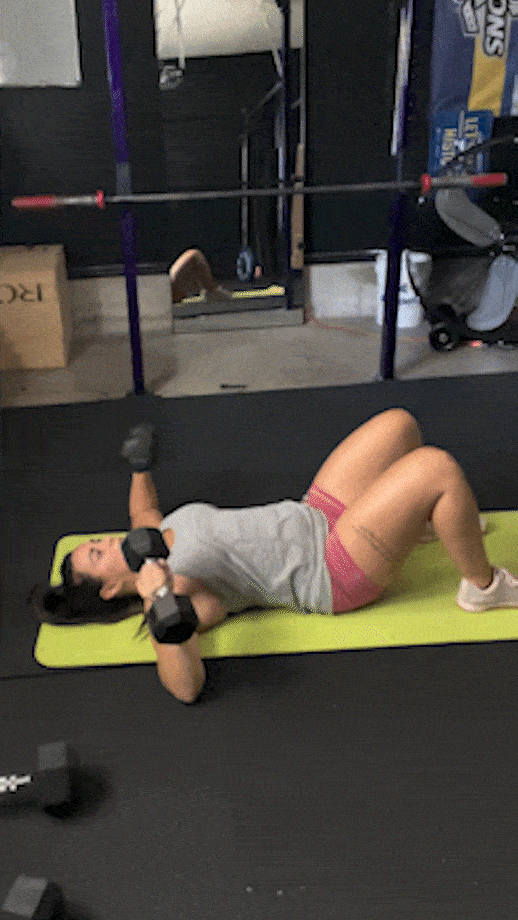
Dumbbell Thrusters
Why Do It:
Dumbbell thrusters offer full-body strength conditioning with some cardio benefits. You will feel an intense burn in your shoulders, hamstrings, glutes, and quads while also engaging your arms, back, and core muscles.
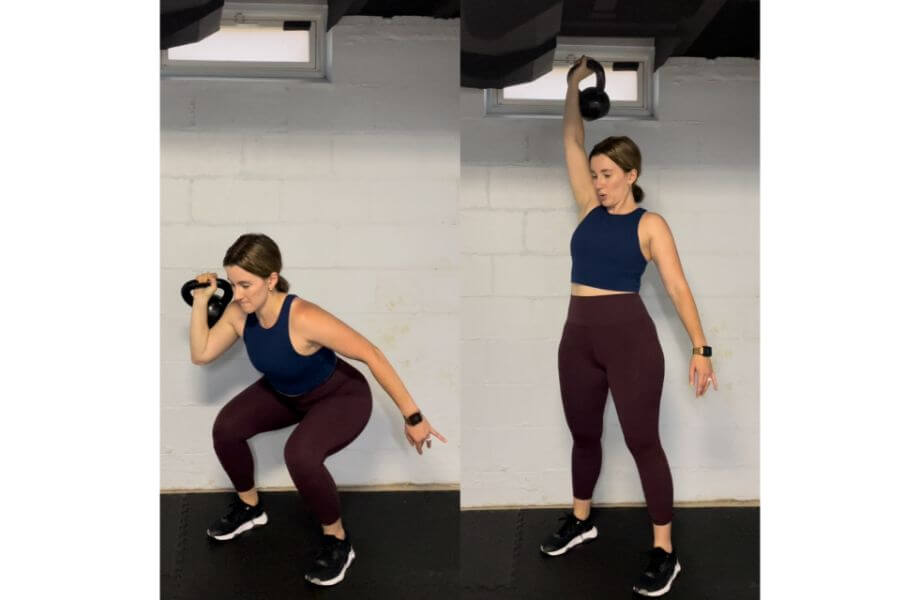
How to Do It:
- Set your stance by placing your feet shoulder-width apart and holding your dumbbells on each shoulder (with the back head of the dumbbell resting on your shoulder).
- While firmly holding your dumbbells, perform a full squat to where your glutes are nearly parallel to the floor.
- From a lowered squat position, aggressively stand up while firmly raising your arms so that the dumbbells are fully extended above your head (utilize the force of standing up to push the dumbbells upwards).
- After fully extending the dumbbells, gently return to your starting position, maintaining your stance and composure, then repeat.
Lunge and Bicep Curl
Why Do It:
The lunge and dumbbell bicep curl exercise is a strength-focused movement that primarily engages your glutes and broader leg muscles. However, the incorporated dumbbell curl helps to build your biceps while adding beneficial weight resistance to your lunges.
How to Do It:
- Start by standing up straight with your feet hip-width apart and your arms at your sides, fully extended while grasping the dumbbells.
- From your starting position, lunge one leg forward while lowering your hips until you find both your knees angled at 90 degrees. Your extended leg should have its knee hovering above your ankle, with your rear leg balancing and supporting your weight on the balls of its foot.
- Once in a lunged position, conduct a bicep curl with each arm holding the dumbbells.
- Then lower the dumbbells back to your sides, and push off your extended leg to return to your starting position. Repeat with your other side while continuing a bicep curl with each alternating lunge.
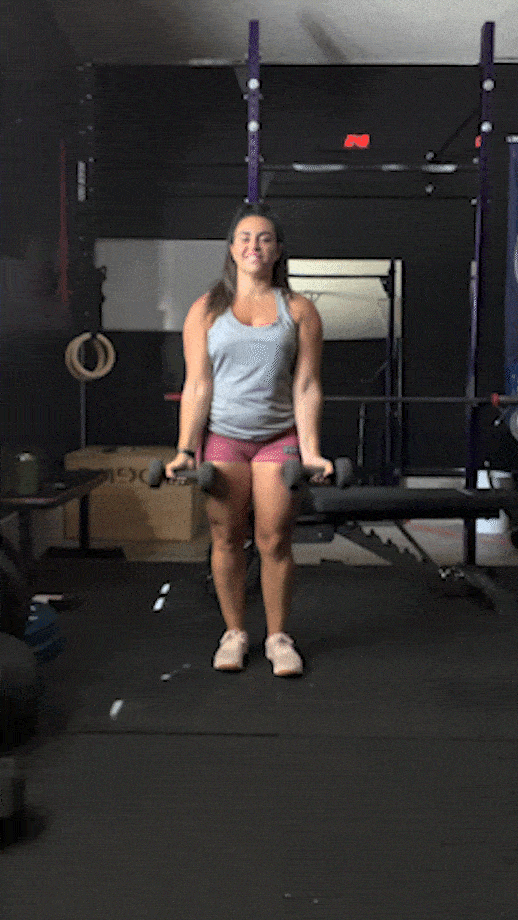
Dumbbell Triceps Extension
Why Do It:
The dumbbell triceps extension is a strength-focused exercise that primarily targets your triceps, shoulders, and core. The exercise can be done using one or two dumbbells, but we will explain how to do it using one.
How to Do It:
- Stand with your feet slightly separated yet firmly planted on the ground. Make sure your core is engaged and your stance is balanced. Once planted, grab a dumbbell by its center grip using both hands.
- Then carefully place the dumbbell behind your head, holding it with your elbows bent parallel to the sides of your head.
- Lift the dumbbell directly over your head by gently extending your arms fully upwards. Be sure to retain a firm posture and engaged core, and be mindful not to hit your head as you raise the dumbbell.
- Slowly lower the dumbbell back to your rear-head level, then repeat.
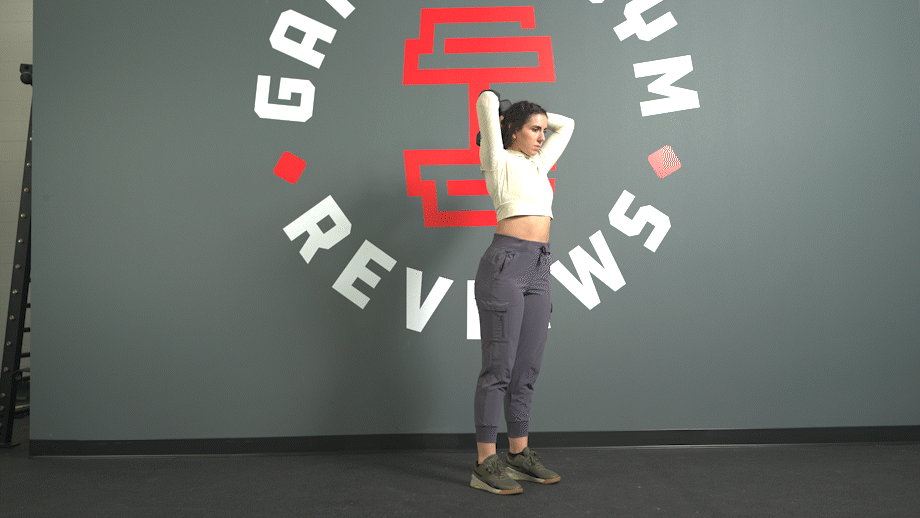
Burpees
Why Do It:
Burpees are one of the most efficient equipment-free exercises that exist! Burpees offer both cardio and strength benefits and a total body workout. Burpees engage the muscles in your core, quads, glutes, shoulders, arms, and hamstrings. Furthermore, burpees are an intense cardio exercise that efficiently burns calories and fat, elevates your heart rate, and speeds up your metabolism.
There are many types of burpees, however, we will focus on cardio burpees that do not include a push-up for this exercise.
How to Do It:
- Starting in a squatted position, jump up as high as you can. Aim for a height where your toes are pointing to the ground. While not necessary, you can include a clap over your head as you jump to help with rhythm and to keep your back straight while in the air.
- As you come down, land on the balls of your feet to avoid stressing your knees. As soon as you land, place your hands on the ground and kick your legs back to put yourself in a high plank position, ensuring a straight line from your head to your heels (bending your back could lead to injury and disrupt the burpees’ flow and benefits).
- Once in the up-plank position, immediately get out of it by bringing your legs forward while engaging your core and landing in your original squatted position, then repeat.
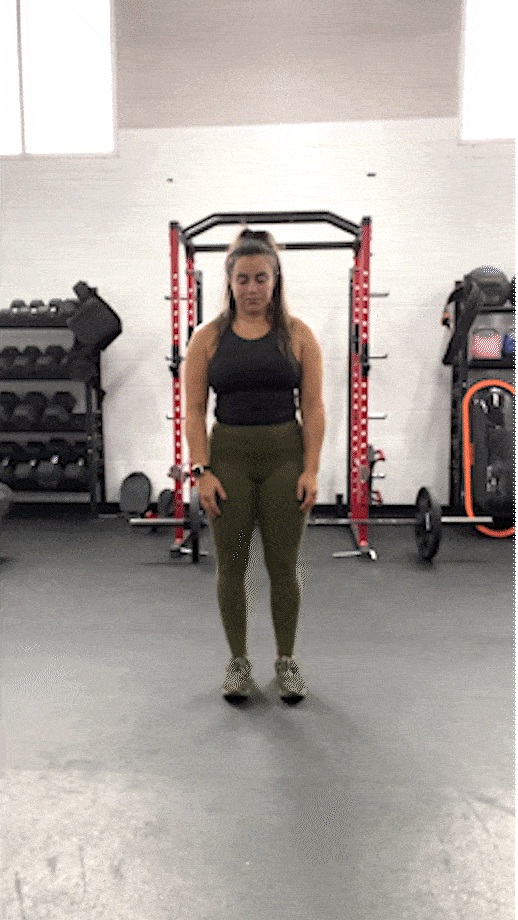
Aiming your knees to the sides of your elbows as you return upwards is a helpful way to keep the movement fluid. Maintaining intense speed and fluidity as you move up and down will create the most cardio-efficient and safe burpee experience.
As you progress the movement, you can lower the body all the way to the ground and perform a push-up on every rep.
Tips for a Good Upper-Body Cardio Workout
Want to get the most out of your workout? Follow these tips:
Tip 1: Keep It Moving
While we need to reset between different exercises properly to ensure fluid transitions and safe technique, these are not excuses for resting. On the contrary, using these as chances to relax is just cheating yourself if you want to reap cardio benefits. Perform exercises one after the other, but not so quickly that your form breaks down.
Tip 2: Focus on Form
Moving quickly is essential in getting that intense cardio experience; however, balance and composure are equally necessary to ensure we are training safely. Prioritize technique and fluid, thought-out movements over rushing. This will help you to improve correctly with time and leave workouts feeling stronger rather than injured.
Tip 3: Stay Light on Your Feet
Whether jumping or mountain climbing, always be light on your feet and land on the balls of your feet. Being light on your feet is not only essential to keeping an efficient cardio-stimulating pace; in the case of jumping, for example, it can seriously prevent injuries and strains in your knees.
Upper Body Cardio Workout: Q&A
Should I do cardio on upper body day?
This all depends on what your goals are. If your goal is to simply get huge muscles, you may focus just on lifting weights in an upper body workout without cardio. If your goal is overall health, wellness, and fitness, then incorporating cardio is a good idea.
RELATED: Cardio vs Strength Training
Which cardio burns the most fat?
Generally speaking, your level of intensity in a workout and the time you spend doing it will dictate how many calories and how much fat you burn. Harvard Health did a great study on activities that burn the most calories based on body weight.
Running is one of the most efficient exercise for burning fat and calories, if your goals include weight loss. However, biking and swimming offer similar benefits while delivering a more low-impact experience for your joints.
Going beyond simply burning calories, if you’re looking to get toned, it’s always good to combine cardio exercises with strength exercises to help burn fat and create toned muscle. Considering this, I would also suggest experimenting with HIIT workouts as a great introduction to cardio-based training that includes elements of focused strength-building.
How do you do cardio for your arms?
Technically, there is no such thing as “cardio for your arms.” If you’re looking to build strength in your arms during a cardio workout, I like these exercises:
– Jumping rope
– Burpees
– Swimming
– Rowing
– Biking
What are the top cardio workouts?
My top 10 cardio workouts:
– Burpees
– Running/sprints (treadmill and outdoors)
– Swimming
– Biking (stationary and outdoors)
– Rowing (stationary and outdoors)
– Ellipticals
– Squat jumps
– Mountain Climbers
– Jumping rope
– Stair climbing/running (stationary and outdoors)




